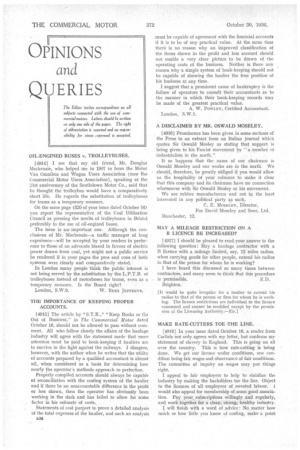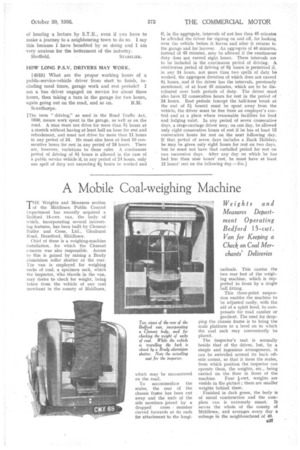OPINIONS
Page 46

Page 47

If you've noticed an error in this article please click here to report it so we can fix it.
and
QUERIES
OIL-ENGINED BUSES v. TROLLEYBUSES.
[4914] 1 see that my old friend, Mr. Douglas Mackenzie, who helped me in 1907 to form the Motor Van Omnibus and Wagon Users Association (now the Commercial Motor Users Association), speaking at the 21st anniversary of the Southdown Motor Co., said that lie thought the trolleybus would have a comparatively short life. He regards the substitution of trolleybuses for trains as a temporary measure.
On the same page (320 of your issue dated October 16) you report the representative of the Coal Utilization Council as pressing the merits of trolleybuses in Bristol preferably to the use of oil-engined buses.
The issue is as important one. Although the conclusions of Mr. Mackenzie—a traffic manager of long experience—will be accepted by your readers in preference to those of an advocate biased in favour of electric power drawn from coal, yet might not a public service be rendered if in your pages the pros and cons of both systems were clearly and comparatively stated.
In London many people think the public. interest is not being served by the substitution by the. L.P.T.B. of trolleybuses instead of motorbuses for trams, even as a temporary measure. Is the Board right?
London, S.W.9. , W. REES JEFFREYS.
THE IMPORTANCE OF KEEPING PROPER ACCOUNTS.
[4915] The article by "S.T.R.," "Keep Books or Co Out of Business," in The C'ontmercial Motor dated October 16, should not be allowed to pass without comment. All who follow closely the affairs of the haulage industry will agree with the statement made that more attention must be paid to book-keeping if hauliers are to survive in the fight against the railways. I disagree, however, with the author when he writes that the utility of accounts prepared by a qualified accountant is almost nil, when considered as a basis for determining how nearly the operator's methods approach to perfection.
Properly compiled accounts should always be capable of reconciliation with the costing system of the haulier and if there be an unaccountable difference in the profit or loss shown, then the operator has obviously been working in the dark and has failed to allow for some factor in his estimate of costs.
Statements of cost purport to prove a detailed analysis of the total expenses of the haulier, and such an analysis B36 must be capable of agreement with the financial accounts if it is to be of any practical value. At the same time thera is no reason why an improved classification of the items shown in the profit and loss account should not enable a very clear picture to be drawn of the operating costs of the business. Neither is there any reason why a simple system of book-keeping should not be capable of showing the haulier the true position of his business at any time.
I suggest that a prominent cause of bankruptcy is the failure of operators to consult their accountants as to the manner in which their book-keeping records may be made of the greatest practical value.
A. W. POWLEY, Certified Accountant. London, S.W.1.
A DISCLAIMER BY MR. OSWALD MOSELEY.
[4916] Prominence has been given in some sections of the Press to an extract from an Italian journal which quotes Sir Oswald Mosley as stating that support is being given to his Fascist movement by "a number or industrialists in the north."
It so happens that the name of our chairman is Oswald Moseley and our works are in the north. We should, therefore, be greatly obliged if you would allow us the hospitality of your columns to make it clear that this company and its chairman have no connection whatsoever with Sir Oswald Mosley or his movement.
We are rubber manufacturers and not in the least interested in any political party as such. C. E. MosEeEy, Director, For David Moseley and Sons, Ltd.
Manchester, 12.
MAY A MILEAGE RESTRICTION ON A B LICENCE BE INCREASED?
[4917] I should be pleased to read your answer to the following question: May a haulage contractor with a B licence with a mileage limited, say, 12 miles radius, when carrying goods for other people, extend his radius to that of the person for whom he is working?
I have heard this discussed so many times between contractors, and many seem to think that this procedure is permissible. • E.D. Brighton.
[It would be quite irregular for a haulier to extend his radius to that of the person or firm for whom he is work. ing. The licence restrictions are individual to the licence concerned and cannot be modified except by the permission of the Licensing Authority.—En.]
MAKE RATE-CUTTERS TOE THE LINE.
[4918] In your issue dated October 16, a reader from Carlisle not only agrees with my letter, but confirms my statement of slavery in England. This is going on all over the country. This is how rate-cutting is being done. We get our licence under conditions, one condition being fair wages and observance of fair conditions. The committee of inquiry on wages may put things right.
appeal to fair employers to help to stabilize the industry by making the backsliders toe the line. Object to the licences of all employers of sweated labour. 1 would also appeal for membership of some good association. Pay your subscriptions willingly and regularly, and work :together for a clean, strong, healthy industry.
I will finish with a word of advice No matter how much or how little you know of costing, make. a point of hearing a lecture by S.T.R., even if you have to make a journey to a neighbouring town to do so. I say this because I have benefited by so doing and I am very anxious for tire betterment of the industry.
Sheffield. STABILIZE.
HOW LONG P.S.V. DRIVERS MAY WORK.
[4.912] What are the proper working hours of a public-service-vehicle driver from start to finish, including meal times, garage work and rest periods? I am a bus driver engaged on service for about three hours, then taking a turn in the garage for two hours, again going out on the road, and so on. R.M. Scunthorpe.
[The term " driving," as used in the Road Traffic Act, 1980, means work spent in the garage, as well as on the road, A man must not drive for more than 51 hours at a stretch without having at least half an hour for rest and refreshment, and must not•drive for more than 11 hours in any period of 24. He must also have at least 10 consecutive hours for rest in any period of 24 hours. There are, however, variations to these rules. A continuous period of driving of 81 hours is allowed in the case of a public service vehicle if, in any period of 24 hours, only one spell of duty not exceeding 8/ hours be worked and
If, in the aggregate, intervals of not less than 45 minutes be afforded the driver for signing on and off, for looking over the vehicle before it leaves and after it returns to the garage and for layover. An aggregate of 40 minutes. instead of 45 minutes, may be allowed if the continuous duty does not exceed eight hours. These intervals are to be included in the continuous period of driving. A. continuous period of driving of (54hours is permitted if, in any 24 hours, not more than two spells of duty be worked, the aggregate duration of which does not exceed 81 hours, and if the driver has the intervals, previously mentioned, of at least 45 minutes, which are to be distributed over both periods of duty. The driver must also have 12 consecutive hours for rest in the period of 24 hours. Restperiods (except the half-hour break at the end of 51 hours) must be spent away from the vehicle, the driver must be free from an employer's control and at a place where reasonable facilities for food and lodging exist. In any period of seven consecutive days, a stage-carriage driver may, on one day, be allowed only eight consecutive hours of rest if he has at least 12 consecutive hours for rest on the next following day. If that period of seven days includes a Bank Holiday, he may be given only eight hours for rest on two days, but he must not have that curtailed period for rest on two successive days. After any day on which he has had less than nine hours' rest, he must have at least 12 hours' rest on the following day.—En.]




















































































